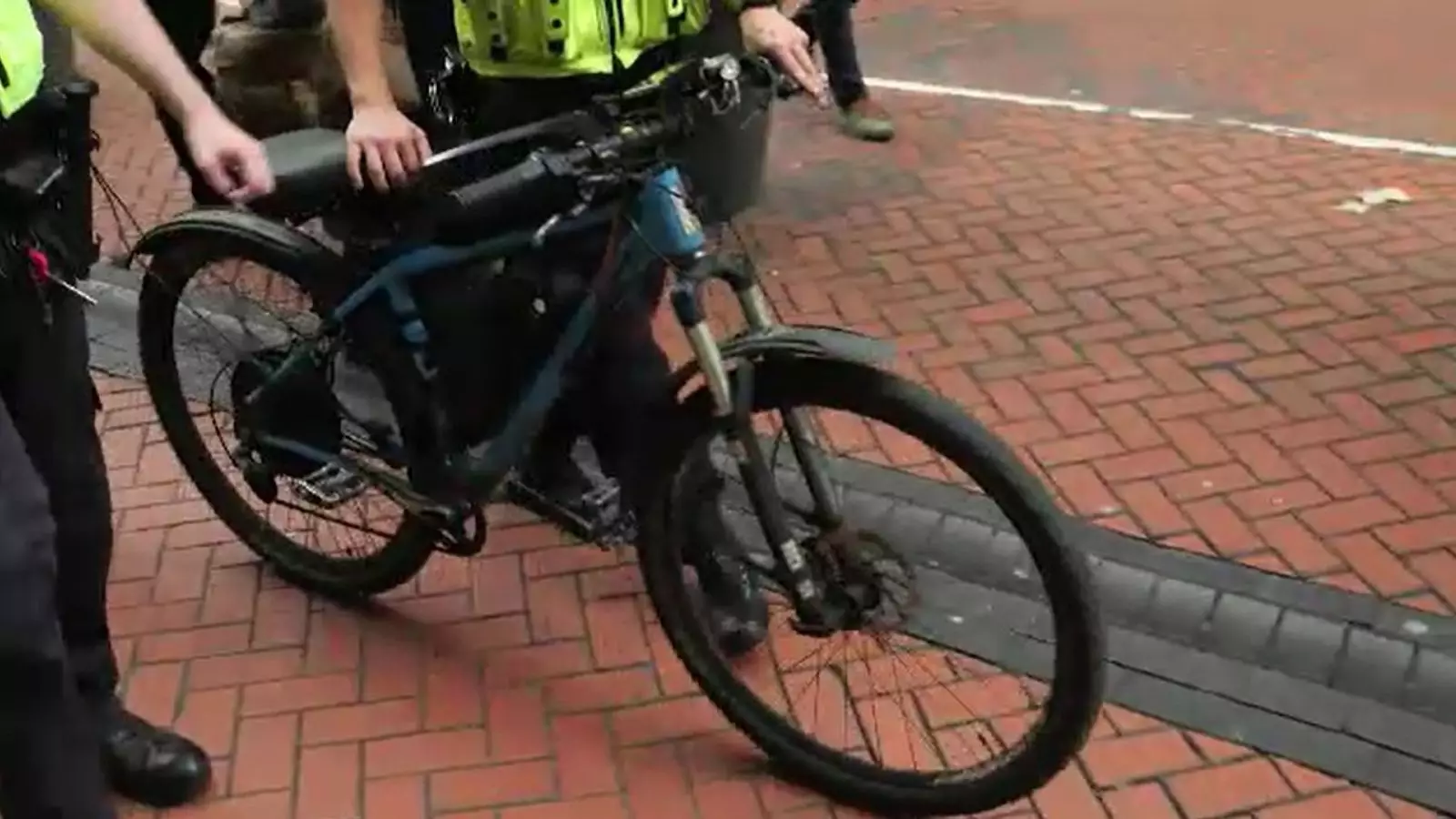In the bustling heart of Birmingham’s New Street, a police operation targeting illegally modified e-bikes unveils more than just a superficial attempt at regulation. While law enforcement officers confiscate bikes that exceed legal speed limits and endanger pedestrians, this enforcement represents only the surface of a deeper issue—an inherent flaw in the current approach to urban safety that disproportionately criminalizes the very workers vital to our economy. It’s easy to focus on the visible dangers—speeding bikes and reckless riders—but doing so risks ignoring the systemic problems that propel these practices and the need for more comprehensive, humane solutions.
The police’s swift action against modified bikes, though necessary on paper, often overlooks the broader social landscape. The riders—many of whom are food delivery workers—are caught in a fragile intersection of economic necessity and regulatory neglect. These workers operate under intense pressure to deliver quickly, often pushing the limits of safety and legality to survive in a gig economy that offers little protection or security. When authorities focus narrowly on confiscation, they sideline the root causes—namely, why such modifications are sought in the first place: the demand for speed, reliability, and a livelihood in an unstable industry.
The Myth of Simple Criminality
The narrative surrounding these riders often frames their behavior as purely criminal or irresponsible. However, this perspective is reductive and dismissive of the socioeconomic realities driving their actions. The assumption that a faster bike equals a reckless rider ignores the fact that many workers see these modifications as essential tools to stay competitive and meet customer demands. These modifications—though illegal—are driven by necessity, not malice. Penalizing individuals without addressing the structural inequalities they face risks perpetuating a cycle where the real problem remains unaddressed: the lack of affordable, safe, and legal transportation options that serve the needs of gig workers and urban residents alike.
Furthermore, the image painted by law enforcement tends to distort the complexity of urban mobility. Speeding e-bikes are portrayed as threats, but their danger should be contextualized within the broader challenge of urban congestion and inadequate infrastructure. Many of these riders are simply trying to navigate a system that has little space for their mobility or safety concerns. Instead of viewing modifications as the problem, policymakers should ask: why are these workers resorting to such measures? The answer lies in an infrastructural failure to accommodate the realities of modern urban labor.
Counterproductive Policing and Social Exclusion
The political and social implications of such strict enforcement are significant. Targeting individual workers through confiscation and potential criminal charges alienates a vulnerable segment of the population, amplifying feelings of insecurity and exclusion. It’s a reactive approach that overlooks opportunities for constructive engagement and regulation that prioritize safety without criminalizing livelihoods. While public safety is crucial, the methods deployed need reevaluation—more inclusive strategies could foster safer working conditions rather than simply punishing those who are trying to make ends meet.
Moreover, the involvement of immigration officials in these operations highlights another dimension—namely, the convergence of socio-economic marginalization with immigration enforcement. Such broad sweeps risk criminalizing more than just illegal modifications; they threaten to entrench marginalization, disproportionately impacting communities already on the fringes of society. Addressing illegal modifications should not be solely about enforcement but about creating pathways for legal participation, safety standards, and fair working conditions.
Reimagining Urban Transportation and Worker Rights
This scenario points to a much-needed paradigm shift in how cities deal with sustainability, safety, and urban mobility. Instead of focusing solely on punitive measures, authorities and stakeholders should invest in infrastructure upgrades, electrification programs, and accessible legal alternatives for workers. Recognizing delivery riders as vital contributors, policies should aim for safer, legal modifications and regulated riding solutions, not criminalization. Urban safety cannot be achieved by isolating individuals but must include integrating safe transit corridors, legal frameworks, and support systems that acknowledge the realities faced by gig economy workers.
Additionally, fast-food delivery platforms must step up beyond mere disclaimers and safety reminders. They hold significant responsibility—by providing training, safer equipment, and supporting legal modifications—that not only improves safety but also legitimizes their workers’ working conditions. Public discourse often neglects these systemic responsibilities in favor of sensationalism around illegal bikes and speed limits. An honest, empathetic approach would be to view the situation as a societal challenge—one that requires compassion, innovation, and pragmatic regulation rather than a purely punitive crackdown.
The crackdown on modified bikes reveals a failure to see the human stories behind the speeding two-wheelers. It exposes a narrow, enforcement-driven approach that risks collateral damage—creating more marginalization, undermining safety, and ignoring economic realities. Urban mobility and worker rights deserve a more nuanced, thoughtful response—one rooted in reform, support, and human dignity.

Leave a Reply